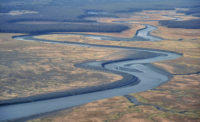Environment
US Supreme Court Asked to Intervene on EPA Pebble Mine Decision

US Environmental Protection Agency blocked development of Pebble Mine project last January under the federal Clean Water Act.
Photo courtesy Northern Dynasty Minerals Ltd.
In a new strategy to challenge the U.S. Environmental Protection Agency’s rejection of the giant Pebble Mine project in Alaska’s Bristol Bay, the state has asked the U.S. Supreme Court to intervene without any prior litigation in lower federal courts.
EPA blocked the proposed open pit gold and copper mine in January, claiming its dredge and fill disposal would harm one of the world's most environmentally sensitive and valuable wild salmon fisheries. It was only the third time the agency has used its authority under Section 404(c) of the federal Clean Water Act to veto a project.
The proposed mine in the Bristol Bay watershed, located about 200 miles southwest of Anchorage, would be in an area that provides half the world’s wild sockeye salmon supply and has been in dispute for more than a decade.
Project’s developer Pebble Limited Partnership has standing to challenge EPA’s action in a federal trial court. But Alaska moved on July 26 to bypass lower courts by asking the high court to exercise “original jurisdiction” over state claims that the federal agency abused its Section 404(c) authority.
Section 404(c) allows EPA to restrict discharges of dredge and fill material into the waters of the U.S.
The state contend that under the U.S. Constitution, the Supreme Court has original jurisdiction over cases “in which a state shall be party.”
“An original action … is an extraordinary ask, but it’s appropriate given the extraordinary decision being challenged,” Alaska Attorney General Treg Taylor said in a statement. “It’s an indefensible and unprecedented power grab that the U.S. Supreme Court should find unlawful,” he added.
In a statement, Ron Thiessen, president and CEO of Northern Dynasty, the Canadian firm that owns the mine developer, said the company "very strongly" supports Alaska's argument.
"It is Northern Dynasty’s intention to support the State in its claims before the Supreme Court and, if necessary, to file actions in the lower courts to raise these and other reasons why the EPA veto must be withdrawn," he said.
Environmental groups and local indigenous tribes have consistently fought the effort to develop Pebble Mine, with six local tribes in 2010 asking EPA to intervene. In its January determination, the agency said that “specific discharges associated with developing the Pebble deposit will have unacceptable and adverse effects on certain salmon fishery areas in the Bristol Bay watershed.”
In its Supreme Court brief, Alaska contends that “no land-use project in recent memory is more important to the state than the Pebble deposit. It would generate billions of dollars in revenue for the state and tens of thousands of jobs for Alaskans, many of whom are rural residents with limited economic opportunities.” The state says its claims are “serious and dignified” in part because they represent the state’s “unique sovereign and fiscal interests.”
Additionally, Alaska claims that the high court’s “discretionary approach” to original jurisdiction is “flawed” and that it has a mandatory obligation to accept the case.



